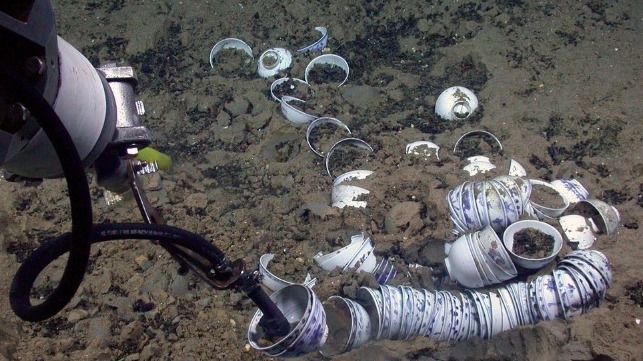Cypriot Officials, Wreck Hunters Dispute Title to Ancient Artifacts

Customs authorities in Cyprus have seized artifacts raised by the privately-funded Enigma Shipwrecks Project from a wreck site in the Eastern Mediterranean. The Cypriot government has objected to the retrieval activity in strong terms, accusing the firm of “violently extracting objects, causing destruction to their context" with an intent to sell.
The wreck in question is a 1,000 dwt Ottomon-era merchant ship that went down in the Levantine Basin - about halfway between Lebanon and Cyprus - in or around the year 1630. It was carrying a cargo of Ming Dynasty Chinese porcelain, Italian stoneware, Indian peppercorns, copper coffee pots and other luxury items. Using ROV technology, the Enigma team recovered 588 objects from the site. Nearby, the company located 11 more wrecked vessels dating back as far as 2,200 years.
“This is truly ground-breaking, one the most incredible discoveries under the Mediterranean," said the project's archaeologist, Sean Kingsley, in a recent interview. “The goods and belongings of the 14 cultures and civilisations discovered, spanning on one side of the globe China, India, the Persian Gulf and Red Sea, and to the west North Africa, Italy, Spain, Portugal and Belgium, are remarkably cosmopolitan for pre-modern shipping of any era.”
The excavation ended in 2015, and post-excavation work continued at the company's base in Cyprus over the intervening years - until the recent seizure by Cypriot officials. The existence of the find was revealed to the public in April.
Enigma asserts that the wreck site is not it Cypriot waters, and it says that despite Cyprus' accusations, it has no intention of selling the collection; instead, it would like to see the artifacts put on public display at a major museum. Cyprus also maintains that it has no plans for an auction. "The Cypriot authorities will in no way proceed with the auction of objects . . . since this is contrary to both the moral principles and the provisions of the Antiquities Act," said Cyprus' Department of Antiquities in a statement.
